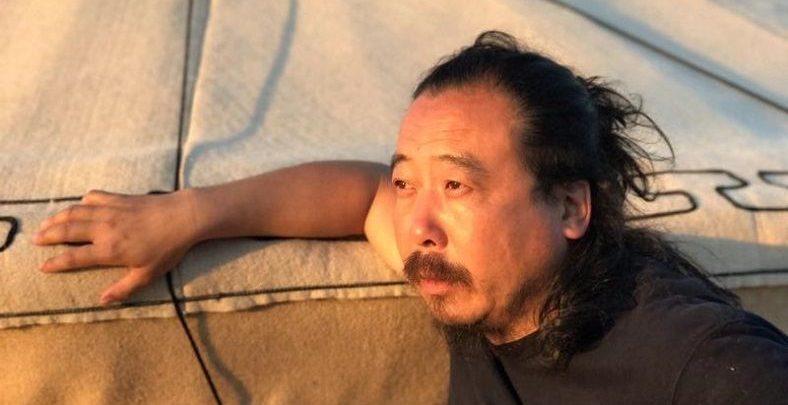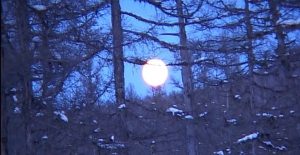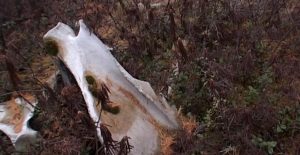Last Updated on September 25, 2022
When they first moved, the media reported that “hunters happily moved to their new homes.” But behind the camera, the Evenki were crying.
Gu Tao
Gu Tao’s introduction and his works distributed by Orient Indie Films.
The Evenki
The Evenki Trilogy Documentaries
Q: Can you introduce your documentaries of the Evenki trilogy?
Gu Tao: “Aoluguya, Aoluguya” is about the experience of Evenki people moving back to the forest, focusing on the northern ethnic minority in the current state of survival. I continued to spend a lot of time with them, and after three years gradually discovered the specific character of Liuxia. The relationship between her and her son in “Yuguo and His Mother” is about love, humanity, nature, and it talks about personal destiny. After several years, there was more information about her brother Weijia, and I produced the “The Last Moose in Aoluguya”. It not only records the life of an Evenki with unique artistic talent, but also reflects on the ethnic group, belief, civilization, and politics.
Read this post to see what people say about the Evenki.
Aoluguya, Aoluguya
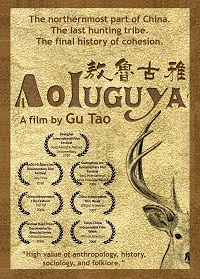
Q: Please tell us more about Aoluguya, Aoluguya.
Introduction to Aoluguya
The Evenki people originated from the shores of Lake Baikal more than 2000 BC. At present, the Evenki ethnic group in China is divided into three groups, among which the number of Evenki reindeer herders is the least. Now there are less than 50 people with the true Evenki descent, and less than 200 people living in Aoluguya.
“Evenki” means “people living in the mountains”, and “Aoluguya” means “a place where poplar forests flourish” in their language. The Aoluguya Evenki were traditionally hunter-gatherers. Because the Aoluguya Evenki people use a large number of reindeer in their life and production, they are also known as “deer tribe” and “Evenki reindeer herders”.
Overcome Challenges
I came to Aoluguya in order to visit old friends of my father for him, I realized that this is the place where I have been looking for, here is what I really want to do.
One of the local elders, Maria-Suo, is the chief, and she didn’t come down as an ecological settler. She has been living in the forest for 90 years. Because my father had shot her 30 years ago, she thought of me as the child of an old friend. However, when I really stood in the middle of the Evenki, I deeply felt the huge gap between us. The start of the documentary work was not smooth. In the beginning, I was not allowed to go to the mountain of hunters’ point. But I never gave up my ideal, then gradually won the trust and goodwill of hunters.
At that time, I lived there with the camera, and would work with them in the mountain. I simply observed and shot without a purpose. I didn’t think of myself as a documentary director, but just escaped the boring life and work in Beijing. Fooling around with cameras for one year and then I really started shooting. After spending a year with them and communicating with them, the shooting started to get interesting.
Aoluguya, Aoluguya is about the chief and several families moving back to the forest with reindeer after the ecological migration because they don’t adapt to the settlement life. I finished this documentary out of the materials I had shot for three years.
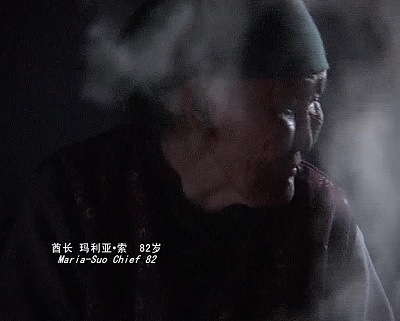
Q: The Evenki in Aoluguya, Aoluguya have a sense of loss. Is it caused by the contradiction between modernization and traditional life?
Gu Tao: Travelers will find the sky and river in the forest very clean and beautiful. But if you live there, there is actually a sense of sadness over the entire Greater Khingan mountains. In this era, the living space of the forest ethnic group is getting narrower, the ecology is destroyed, and they lose the traditional way.
The Aoluguya, the only Evenki tribe to raise reindeer, have the most unique attachment to it. Living in the forest for such a long time, the feelings of the Aoluguya have been integrated into nature. Therefore, all the changes of natural scenery will affect the changes of their emotions.
The Evenki and reindeer have been friends for generations. The footprints of the reindeer are their footprints, and the history of the reindeer is like their history. Therefore, Evenki people’s life, from hunting, migration, to daily necessities, all have something to do with deer. Reindeer are also good helpers for hunters. No matter how far they travel, reindeer can safely deliver their prey.
The Evenki have lived with deer since ancient times and never left their reindeer. Deer have different food chains in different seasons, and they set up camp wherever they go. In 2003, the state organized the ecological migration of Evenki people to move out of the forest, and they took the reindeer down the mountain. In the beautiful new house, the reindeer fell, and the deer were sent back to the mountains within a week. Reindeer can’t leave the forest. Can people leave? So some Evenki returned to the forest with reindeer, but the entanglement between the city and the forest took root. I just started shooting when they got back into the mountains.
Read endorsement & issues review and subscribe now to watch Aoluguya, Aoluguya online with 20% off! And stay notified about Asia-related insights & latest offers.
Q: Do they have any idea about the migration? Do all of they not want to move?
There are immigrants everywhere, but they have not changed the fundamental way of life. However, for the Evenki, it was like they were moving out of the forest, to a place very close to the city. Mainly due to the confiscation of the shotgun, which was their tool for living, so there were all kinds of emotions. When they first moved, the media reported that “hunters happily moved to their new homes.” But behind the camera, the Evenki were crying. Not to mention people, even deer were not adapted. They said the water under the mountain was smelly and they were used to the natural water in the forest.
Q: There is no prey left on the mountain. Isn’t it natural to go out of mountain?
Gu Tao: It has long been a popular misconception that the animals on the mountains have been hunted down by hunters. It’s actually all done by poachers! Reindeer are wild. The Evenki go to the mountains to look for deer and raise them, and poachers trap them in their path. Once trapped, the deer can hardly survive and can only be killed on the spot.
The Evenki rarely kill their own deer. They are in awe of nature. They don’t shoot the mother deer, and they only shoot the old and the sick. The Evenki call themselves hunter-gatherers. They follow the laws of nature, and there are clear rules in their timetables, exactly in line with nature. This is enough to show that the Evenki have a choice about nature. In recent years, the animals in the mountains have disappeared. It is not their fault, and they also feel sad about it.
Q: Are there any passages in the film that you consciously influence?
Gu Tao: I choose visiting a grave as the end of the film on purpose. It is a sign that hunting is out of the question.
Yuguo and His Mother
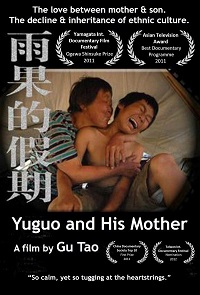
Q: Speaking of Yuguo and His Mother, why would you want to film the next generation of the Evenki?
The Original Plan
Gu Tao: I didn’t plan to shoot the next generation of the Evenki because it is already too heavy. Yuguo was sent to a school in Wuxi for the support of a foundation. By this time, Yuguo had grown up like a city child.
Yuguo’s mother misses him very much. I have been living at his mother Liuxia’s house in Aoluguya and always wanted to do something for her. It occurred to me that the only thing that I could do was to bring Yuguo back to the forest from Wuxi. I then took action, just afraid that Liuxia would die from drinking and couldn’t see her son. But I didn’t bring the video camera, I just wanted to bring Yuguo back to the forest so that his mother could spend a holiday with him.
The Surprise
At first I thought, he is nothing more than a city kid. But seeing the train approaching the edge of the Greater Khingan mountains, Yuguo’s state was not the same, and he had been excited. The closer he came to Aoluguya, the closer he came to his mother, the more his blood seemed to awaken in his bones. I felt the intensity of that ethnic quality in his bones, which was different from that of a boy in the city. Instead of sleeping in his bunk, he laid on the floor of the train, worried.
I thought, this is the child of the mountain and the reindeer herders, who would always return, and whose roots are here. At that time, he had not seen his mother for three or four years, and I wondered what he would look like if he saw her. Therefore, I borrowed a video camera and filmed his first meeting with his mother when he got home, which led to what became Yuguo and His Mother.
Read endorsement and issues review and subscribe now to watch Yuguo and His Mother online with 20% off! And stay notified about Asia-related insights & latest offers.
Q: What do you see from Yuguo?
Gu Tao: Yuguo has two sides. One is his ethnic group, which can’t disappear anywhere. The other side is an identity of modern people entering the city, like enjoy using computers and cell phones. It’s just to see which side he is closer to. Back in Aoluguya, his clansmen and his uncle already felt that Yuguo had changed, that his civilization and his knowledge were not necessarily what he should have.
Q: Your films often show a clash of emotions between two generations, one desperate and sad, and the next more accepting.
True. People can’t control the change of the times, and each generation faces different situation and responsibility. Yuguo is an optimistic child, and he presents the positive and dare-to-face side. But I know that although Liuxia and other people are sad, they also have hope, and their hearts are still full of hope.
The Last Moose of Aoluguya
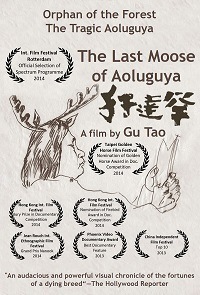
Q: Then you use moose to describe Weijia and shoot the documentary The Last Moose of Aoluguya.
The Origin of Documentary Name
Gu Tao: After five years’ shooting following the completion Yuguo and His Mother, I used the old and new materials to form The Last Moose of Aoluguya (Han Da Han). Han Da Han is a moose and one of the rarest animals in the forest. Due to ecological changes and destruction, moose now have nowhere to live.
When shooting The Last Moose of Aoluguya, I saw a magnificent moose drinking water in the river. Weijia said that the moose can dive, and he once saw its antler which is like an open huge palm carrying out of the water. He was moved by this magnificent beautiful moose. Therefore, he put down the shotgun he had aimed at the target and left slowly without disturbing the natural revelation.
Moose has a characteristic of being especially sensitive, even though it is extremely robust and bigger than a cow. Sensitive animals and people alike seem to be lonelier. So I just use this moose to describe the leading role, Weijia.
About Weijia
He is the loneliest artist in the forest. He writes poetry and paints pictures. Weijia is not like the artists in the city. He doesn’t go to a collector or put his paintings on display in an art gallery. He doesn’t publish his poems, either. When he finishes drinking and creating, he gives his paintings and poems away or burns them.
He is an artist whom I have great respect for. Therefore, during the five years in the forest, I recorded his daily life, including his nostalgia for hunting culture and his sorrow for the arrival of modern civilization. As a result, I completed the documentary of The Last Moose of Aoluguya.
Read issues review and subscribe now to watch The Last Moose of Aoluguya online with 20% off! And stay notified about Asia-related insights & latest offers.
Q: He even fell in love with a teacher in Sanya?
Gu Tao: His mother thought he drank too much and needed someone to take care of him. She then found someone to write a matrimonial notice and post online with her mobile phone number. A teacher from Sanya called, and Wai Jia’s mother told her the truth that Weijia loves drinking and is not handsome. However, teacher Xia’s ex-husband was from the northeast. Although they have divorced, she always likes the attitude of northerners, and she especially likes an artist like Weijia is. Teacher Xia and Weijia’s mother chatted on the phone for two months, and she thought Xia is forthright and sincere.
Then Xia went to Aoluguya. Weijia was not allowed to drink for two days and looked normal. They made an agreement that she would wait for him to go to Sanya and stop drinking. They would get married if he quits drinking successfully. Weijia also wanted to leave the forest and see the life of the ethnic minority in the south. By the time I knew, he had been in Sanya for two months. Later, I went to Sanya to see him and Xia told me about Weijia missing the flight when he took the plane for the first time.
After he was sent to the security check at Beijing airport, he couldn’t find the boarding gate, so he fell asleep on a random chair. Xia was waiting in Sanya to pick him up and didn’t see him, and learned that he was not on the plane after checking the flight. She called the Beijing Airport for the whole night, and the plice looked for him as well. Even the continuous broadcast did not awake him. He was finally found the next day after waking up. As it turned out that he was sleeping next to a Finnish from northern Europe. The police didn’t recognize him.
Q: Weijia went to Sanya, Hainan, and then returned to the Greater Hinggan mountains. Has he changed?
Gu Tao: When Weijia was in Sanya, Hainan, I actually felt very sad. Xia is a very kind person and has a saving attitude towards him. She thinks that Weijia is a good artist and that his drinking has hurt him. However, the wine also inspires Weijia. He and the forest are one, so the hot Sanya is not the right place for him.
I once wrote a sentence on the back train: “The last moose from the forest is trapped in the tropical rainforest. It is not able to roar, only whine.” When I saw Weijia wearing an island suit with coconut trees and sunbathing on the beach, I always felt it was not his. But I have no right to interfere with his happiness or misfortune, only to wait for him to choose his future life. It is also a precious experience for him.
Weijia did paint some pictures in a foreign land. But from the perspective of painting, his paintings in the forest about pines, snow, and so on, are free and brilliant. After arriving in Sanya, although the theme is the same, the tree is a bit like a coconut tree, and the decorative taste becomes stronger. Leaving his own soil, and more or less he will be changed.
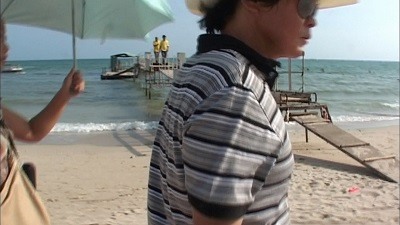
The Main Roles
Q: Liuxia and Weijia are very impressive even after watching so many films and documentaries.
Weijia
Gu Tao: I call Weijia an alcoholic artist. He paints. He tells stories. When he is intoxicated, he could see an old Evenki hunter dancing in a blazing fire, calling when dancing, and Weijia would wail after watching with relish. He’s always been a fan of the Japanese style of seppuku. A few years ago, he really went out of the tent and walked a long way to cut his belly and was rescued.
Liuxia
When Liuxia drinks a lot, all the bowls, shelves, and cabinets would be down, and she wouldn’t wash the dishes. After she becomes sober, she would spend the entire day at home tidying up without saying a word. As a result, her tent is spotless and clean.
She has no love in the world and is always beaten. She is bullied with the context of the death of two husbands, both abnormal deaths. Just like the Han people believe, there is a kind of women who bring bad luck to the husband. Of course, people beat her also for stealing wine or something, but no one knows the kind of missing for son in her heart, that kind of loneliness. She expresses it by drinking and looking at the sun. I think this mother is full of poetry, full of real sorrow.
Liuxia says everything in the sky is hers, and this refers to the natural world. She is close to the deer and puppy, and she looks at the sky, the sun, and stars to miss her son when has nothing to do. She seems to have nothing to do with human society, and could not feel its warmth. And what I face is the sentimentality of an ethnic group. This is the history of the extinction of an ethnic group.
Q: What do they think of the film, which has so much to say about Weijia and his family?
Gu Tao: Weijia’s mom is always suspicious of me. She is a person of strong ethnic pride. For example, she would say, “you’re shooting alcoholics. How ugly!” I would tel her that people who watch my films don’t think they’re alcoholics. They think people who don’t have a purpose in life need to find something else to replace it and balance their lives.
Weijia chooses wine to balance his life, and most of what you see is a loss of civilization. Weijia said what I shot was realistic, and he was judging from an artist’s point of view. I was relieved to hear his evaluation.
Update of Main Roles
Q: What happened to the main roles afterwards?
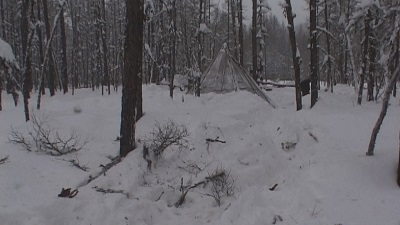
Gu Tao: In the Spring Festival of 2018, I went back to Aoluguya. On the second day of the first lunar month, Aoluguya is still in the cold white world. Yuguo was at the hunters point, and so were his mother Liuxia and uncle Weijia. A month ago, Yuguo’s grandmother died of cancer. Yuguo didn’t manage to see his grandmother for the last time. Because when grandma was dying, he was sent away by the adults to go to the barber’s to cut off the beard. When he returned to the hospital, his grandmother had died.
The day Yuguo’s grandmother died, Liuxia really cried a lot. Weijia did not shed a single tear, so stubborn that the relatives were a little uncomfortable. After the funeral, they went back to hunter point.Weijia and his older sister Liuxia drank all night. Yuguo said this was the only time that he did not stop mother and uncle from drinking. After drinking, Weijia began to cry and lied on the ground to kowtow to the stove for a long time.
Yuguo, 25 years old, with a pair of 300 degree glasses, was very handsome and helpless. His uncle and mother had a good time that New Year because they had never been sober. When his grandma was alive, they were in control. Now they were completely free. Yuguo finally got angry and crushed the wine. Weijia walked another six hours down the mountain, carrying back a pot of wine and a case of beer to continue the festival.
In 2017, Weijia got married. His wife was his mother’s caregiver at the time. She likes painting with traditional ink and wash. Weijia may not like this kind of painting, but he is a dutiful son and agrees to get married. He took wedding photos wearing a suit and tie in a phoeo studio in Genhe. The scenery in the back seemed to have the sunset of Hainan island.
Alcoholism
Q: Mountain Evenki people drink very much, and some even drink to death. Are you consciously shooting them drinking?
Gu Tao: My father went to shoot this Evenki clan 30 years ago and spent a few years with them. Their traditional way of life, it is said, was to come back from hunting and drink around the “Chum” to celebrate. The forests have changed. The poachers went into the mountains after seeing that the Evenki had left the mountain and their guns had been collected. There are more and more outsiders in the woods, and poachers are killing their deer. Now the way of life has changed. There is no purpose in life, no identity, and alcohol has become the medium of anesthesia. Especially in the last few years they drink a lot, this is what I feel.
Many of us ask why someone drinks, but never ask why they choose to drink. Do they really have a choice? Some people have questioned the amount of alcohol and violence in my work. They drink because hunters lose their guns and herders lose their grasslands. Drinking can be a temporary escape from sadness, and it can also be the inspiration for poetry.
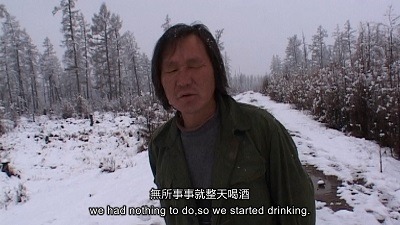
Fighting is not violence. Violence is because there is hatred generated from unequal interests. There is no interest and no hatred, and it is not for hurting each other. This is the expression of innocence, is the true temperament of an ethnic group. If violence must be added, it is pure violence. And all this is the original state that I, the recorder, can really present.
Preservation of Culture
Q: What do you think of the disappearing traditional culture of Aoguluya?
Gu Tao: In my opinion, a culture always disappears, and sometimes it is even the choice of the ethnic group. To let them go back hunting, 99 out of 100 will. However, the only one who is not willing would be a kid, because he/she wants to live in the big city. That’s what they’re afraid of.
In the eyes of children, KTV and computer games at the foot of the mountain are obviously more attractive than life on the mountain, and can help them integrate into modern society more quickly. They want to learn Evenki, but there is no good way. Fewer and fewer old people can speak the traditional language.
The chief Maria-Suo’s daughter also feels conflicted. In the city, there are husband with a health care system and children who need to go to school. On the mountain, there are old people to take care of. Her children, on the other hand, would spend only two days in the mountains during the holidays.
I sometimes fantasize that the government should let the people who want to stay in the forest go back to being hunters. They can work as rangers and get paid. Because they know every river, every mountain very well. Mountains and rivers are named by them, which is ideal.
The Oroqen
The Opaque God
Q: Do you have anything to add to “The Opaque God”?
Gu Tao: Shooting Guan Kouni is not to shoot the Shaman. “The Opaque God” means the invisible God. Originally the Oroqen people had primitive worship. Shamanism is a primitive religion and Shaman is a medium to communicate with God. It’s a belief that comes from their way of life.
It’s this breakdown in its own order that the film is trying to convey. In the 1950s the government thought the Shamanism was superstitious and it was completely dismantled. Now in this era, various places begin to develop ecotourism and seek for the characteristics of cities. It’s making the Shamanism a local culture again. What Guan wants to do as a family ritual turns into a government operation and a show.
Q: And you didn’t manage to shoot the inheritance ceremony?
Gu Tao: No, only the government recorded it. We had to shoot secretly.
Lost Mountain
Q: Why did you shoot the documentary Last Mountain?
Gu Tao: My hometown is in the north of Inner Mongolia, the Oroqen Autonomous Banner. The Oroqen are forest people who have been hunting and gathering for generations. In the new era, the Oroqen ethnic group accepted the reality without knowing what to do after banning hunting.
I started making documentaries in 2005 and completed the Evenki trilogy within six years, during which time I also returned to my hometown of Oroqen. I felt that I had been too used to the life here since I was a child, and realized that it was necessary to record the current living conditions of the Oroqen ethnic group.
Afterwards, I met the main characters in the film at a festival. I saw the helpless attachment to the forest of the two generations, and the commonalities in conflicts of their ideas. All this gave me the courage to make this film, even though there was still something sad about it. As one ethnographer once said: “Ethnic phenomena are not born with us, nor will they survive forever.
The original way of life and production of the hunting tribe has been replaced by a new way in the new era, and it will be a long process to accept and adapt. Hopefully, my record will give some thought to people who pay attention to ethnic minorities in the north.
Q: Why are there very few female characters in the film?
Gu Tao (with a shy smile): It’s embarrassing to shoot women.
Reference: Hangzhou Daily, China Photophers, Zhihu, Pmovie, China Folklore Network, Dongfeng Daily, Liu Zhong Bo, Sinlege, Southern Metropolis Weekly, travellingwith, National Ethnic Affairs Commission of PRC
If you have any questions for director Gu, leave a comment below. We will reach out to him and post his answer. Read this blog post to learn more about what people say about Gu Tao.
Subscribe now to watch Aoluguya, Aoluguya, Yuguo and His Mother, The Last Moose of Aoluguya, The Opaque God, and Lost Mountain online with 20% off! And stay notified about Asia-related insights & latest offers.

